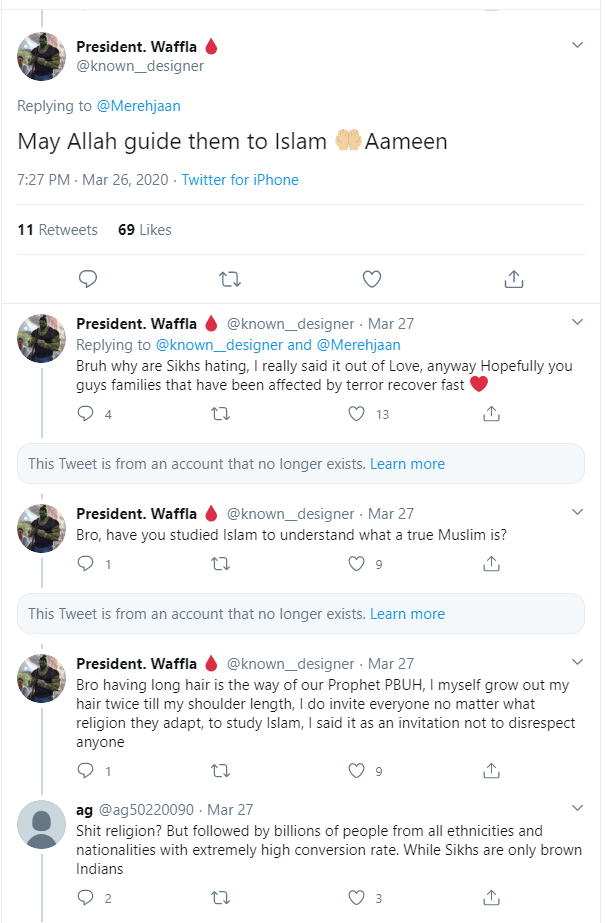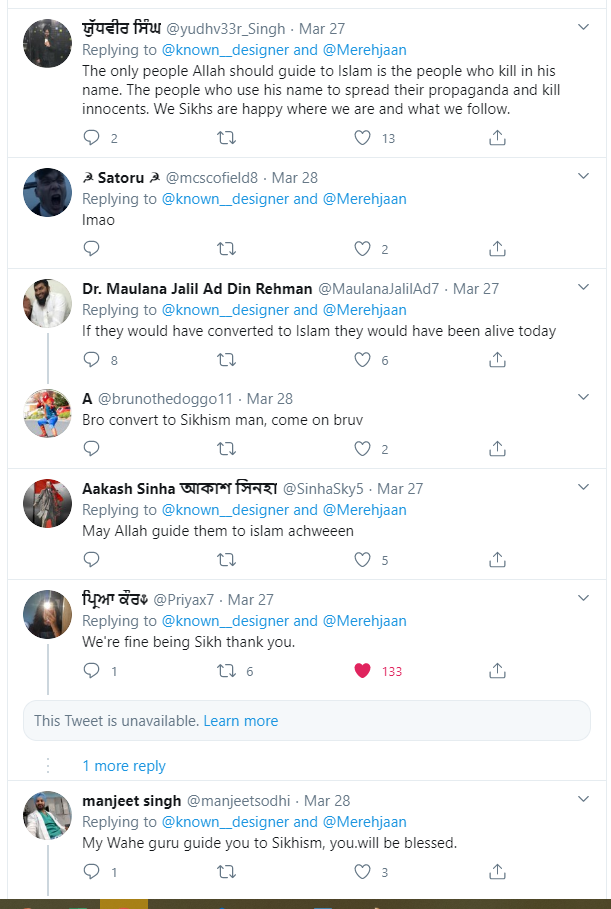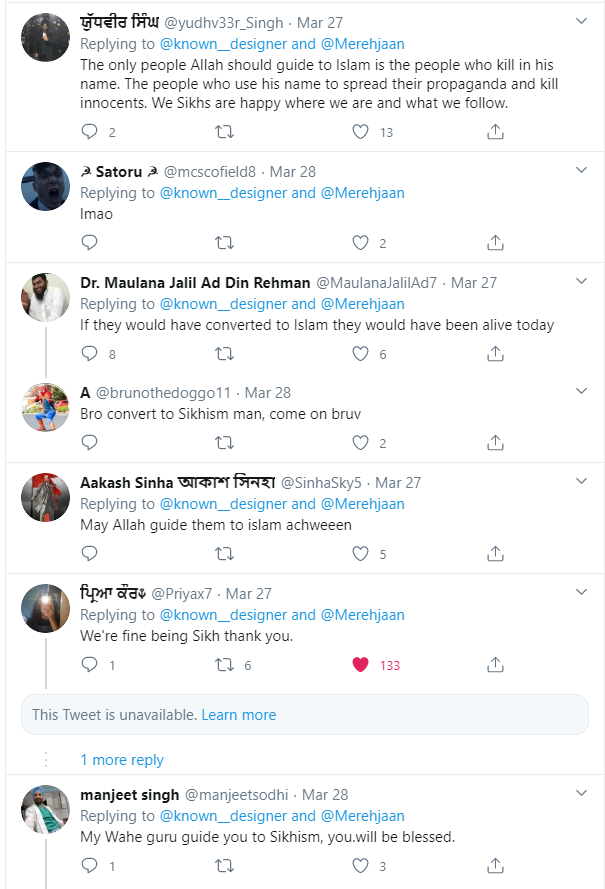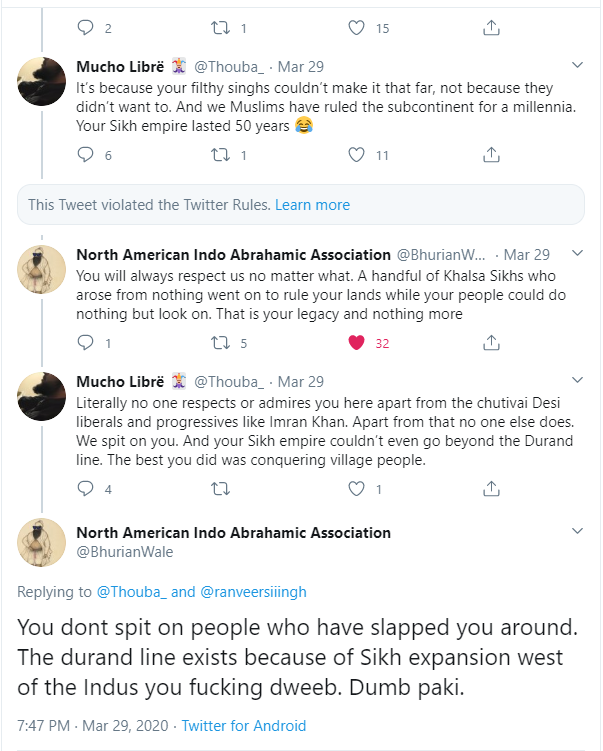Search the Community
Showing results for tags 'afghan'.
-
VJKK VJKF I heard there was an eyewitness account of Baba Deep Singh Ji slaying papis from an afghan soldier complaining to his king that we can kill the Singhs that are alive, but not those who are dead. The name attributed to this work is "Tehmas Khan". Does anyone know what language that book is in? Does it even exist? Where could I find a copy? It seems a little suspicious that an afghan would record an event like this. Thanks.
- 6 replies
-
- baba deep singh ji shaheed
- eyewitness
-
(and 1 more)
Tagged with:
-
Wonder if all the smuggled people were Sikhs ? https://www.manchestereveningnews.co.uk/news/uk-news/people-smugglers-locked-refugee-children-23927198 People smugglers locked children as young as two inside 'coffin-like' wardrobes By Kit Roberts 14:31, 11 MAY 2022 UPDATED18:19, 11 MAY 2022 The group was given a combined sentence of more than 24 years for smuggling 35 Afghan refugees including children as young as two Five people smugglers who locked desperate migrants inside 'coffin-like hides' have been jailed for a combined total of 24 years and two months, the Home Office said. The gang members were sentenced following a trial at Reading Crown Court on May 9. Paramjeet Singh Baweja, 50, and Viljit Singh Khurana, 45, organised the illegal passage of 35 Afghan refugees, including children as young as two and one person with physical disabilities, into the UK. The refugees were concealed within purpose-built wooden hides which were screwed into place. The hides were fitted into vans, which were then driven through French, Belgian, and UK ports. Some migrants were only discovered after they were heard shouting for help. The hides, which were surrounded by furniture loaded into the back of the vans, were used to conceal up to seven people each journey. One group of refugees were discovered "while shouting for their lives" at the point of being unloaded, the Home Office said. Baweja and Khurana pleaded guilty to charges relating to the purchase of the vans and co-ordinating between drivers and minders. Baweja was jailed for six years and nine months, while Khurana was given a six-year sentence. The refugees were screwed into 'hides' which were concealed inside a van Harmohan Singh, 41, and Manmohan Singh Wadhwa, 57, were also sentenced in connection with the case. They were found to be the "minders" who escorted the vans and drivers, and were both jailed for three years and four months. Romanian national Dumitru Bacelan, 29, pleaded guilty to charges relating to the recruitment and organising of drivers. His role also included booking hotels and travel around the UK and Europe
-
https://www.thelawyer.com/women-against-adversity-im-the-first-afghan-sikh-to-be-called-to-the-english-bar/ “I chose a career in law as I want to use advocacy to engage in work that has a direct impact on the lives of others,” says Meeno Chawla. 12 March 2020 SHARE IT I came from Afghanistan in 1995 to England as an immigrant. The 1989 civil war in Afghanistan had a huge impact on the whole country but particularly for religious minorities. Afghanistan used to have a flourishing Afghan Sikh community but because of continuous marginalisation and discrimination, people left. My parents as well as many Afghan Sikhs left for a better life, which included opportunities and basic rights. Those who remain in Afghanistan continue to suffer and face difficulties through constant seclusion and fear. Women in the Afghan Sikh community have traditionally been homemakers, and this was often reinforced in my childhood by members of the community. In Afghanistan there was a lack of educational and work opportunities for girls, especially those from religious minorities. I live with my parents; they have four daughters. I am the youngest and at my birth there were negative reactions from the community as sons were preferred due to passing on the family name. However, my parents have been extremely supportive with my studies and life choices; they have encouraged me to pursue a career at the Bar. My mother works in a fabric shop, where she reinforced the importance of being independent and pursuing a career despite the odds through hard work. I chose a career in law as I want to use advocacy to engage in work that has a direct impact on the lives of others, because both my family and I personally have experienced being in a position of vulnerability and disempowerment. This is why I wish to pursue a career which involves representing people when their fundamental rights and liberties are at stake. I wasn’t considered the brightest at school and was told by a teacher that I should ‘reconsider a career in law as I wasn’t clever enough,’ but I used this as my motivation to do well at school. During my summer holidays, I did work experience at two law firms to get an insight into the different areas of law and how law works in real-life. I went on to study Law with Criminology at The University of Law. I went to networking events and did work experience at the Courts and mini pupillages to get a better understanding of the profession. I was a case manager on the Innocence Project at university. I worked on a case involving a potential miscarriage of justice for two years. This experience was the turning point for me, where I decided that I wanted to become a barrister and be a voice for those who don’t possess much knowledge of the legal system. After graduation, I decided to volunteer at a charity, which helped people with their housing and debt claims. Later, I joined the Crown Prosecution Service, I was overwhelmed with the knowledge and the high pressure yet fast paced environment, but I loved every moment of it and still enjoy my job today! I work closely with prosecution barristers in preparation of their cases and assist them in court. My work taught me how the Criminal Justice System works and that defendants need a Criminal Justice System which they can trust, and which ensures they are being represented. While working at the CPS, I was studying the Bar Professional Training Course part-time. I decided to study the course part-time because despite a scholarship from Middle Temple, I could not afford to pay the full-time fees. The late-night studying, doubts and stress were worth it because I got through it successfully. In October 2019, I was called to the Bar of England and Wales as the first Afghan Sikh. This was a proud moment for me, my family and my community. I used to question whether I would fit in and soon realised my background is and will always be my strength. My secret weapons are perseverance, hard work and a passion to learn on this ongoing journey. Equality and diversity are critical for the rule of law and professional legitimacy. Barristers represent everyone, and the Bar should be more representative of society. Given my background and unique life-experiences, I want to be part of that process and hope people will choose a career in law despite the odds against them. Meeno Chawla The full Women Against Adversity series can be found here. 12 March 2020
-
-
In Afghanistan there used to be prominent Sikh and Hindu communities living along side the Muslim majority. As time went on things got worse. Taliban took over and Hindus and Sikhs were forced to wear yellow arm bands to identify themselves, similar to Jews in Germany! Me and my Hindu and Sikh relatives now live in Southall. Here we have a Afghan Gurdwara and Mandir. Our history shouldn’t be forgotten and you will find this interesting.
- 11 replies
-
Has there been any marriages between the two? I think afghan sikh girls are good looking :excited:
-
Dwindling community struggles to maintain identity. By Mina Habib, Abdal We arent treated as human beings, Sikh businessman Amrit Singh said as he sat in his small grocery shop in the Kabul neighbourhood of Shor Bazaar. When we are alive, we are disrespected, insulted and beaten. And when we take our dead to the crematorium, which is our personal property, they wont let us burn the bodies, saying it stinks. Do we have any rights in this country or not? the 45-year-old asked. Hindus and Sikhs form a miniscule community in todays Afghanistan. Historically playing an important role as traders and entrepreneurs, they lived in Afghanistan in relative harmony for hundreds of years, mostly in the capital Kabul and in the southeastern Khost province. According to Avtar Singh, chairman of the national council of Hindus and Sikhs, the community now numbers only 395 families. Before the collapse of the pro-Soviet regime in 1992, he said, there were around 200,000 people from the two communities. During the civil war that followed, many sought refuge in other countries, India in particular. For those who remained, things got worse under the Taleban government of 1996-2001. Their freedom to practice their religion was restricted, and cremation was banned altogether. Although that ban is no longer in place, Avtar Singh said funeral rites remained a major issue, noting public opposition to the use of the 120-year-old crematorium in Qalacha, southeast of Kabul. When we take our dead bodies to the crematorium, we take the police with us. Even so, local people throw stones at us. They disrespect our dead, he said, adding that despite appeals to the Afghan parliament, the Independent Human Rights Commission, the United Nations mission and the United States embassy, his community had received little help. Daud Amin, deputy police chief in Kabul city, said that his forces were doing their best to protect the minority. We have always worked with them, he said. We have accompanied them and we havent allowed anyone to insult them. Members of the public threw stones at them only once, and we stopped it. We have helped them whenever theyve asked us for help. Residents of Qalacha insisted they had no problems with Hindus and Sikhs, only with the cremations. Gholam Habib Fawad, deputy chairman of the community council in Qalacha, said the crematorium used to be located far from residential areas, but that had changed as more homes were built in its vicinity. When they burn bodies there, the smell goes into the houses, he said. Many people react and fall sick. The children are scared. Some families need to leave their houses for several days and go and live with relatives. Avtar Singh denied that the cremations had any impact on the environment. Representatives from the municipality and the police have been present when we burned the bodies, and even they said they didnt smell anything, he said. Anarkali Kaur Honaryar, a Sikh member of the upper house of parliament, says she has raised the cremation issue at the highest levels. I have pursued [the Qalacha] issue with government officials myself, said Honaryar, who has been the Senates only non-Muslim member since 2010. They have been cooperative. I believe that certain political elements and foreign meddling are creating problems for the Hindus and Sikhs, since we didnt use to have problems with our Muslim brothers. Many Hindus and Sikhs, however, say they face threats, insults and even physical violence from their neighbours. Our women cant go out, said Bajan Singh, who has a grocery shop in Kabul. When our children go to school, they are insulted by their classmates for being Hindu. A number of our Hindu brothers have been beaten and their money stolen. All of our rights have been trampled on. I wish [the government] would move us to some other country. Honaryar acknowledged that Sikhs and Hindus faced some problems, which she attributed to ignorance in the wider community. She said she had asked the media and the Ministry of Hajj and Religious Affairs to launch a public education campaign. In my opinion, the low level of public literacy, immigration [of returning Afghan refugees], and lack of information about the Hindu minority are the causes of this problem, she said. But not everyone is like that. Its just some ignorant people who do these things. I have contacted the police in such cases and they have been wholly cooperative and have punished the individuals involved. Honaryar said she was behind an initiative to build a purpose-built settlement in eastern Kabul complete with schools, a crematorium and other facilities for the Sikhs and Hindus in the city. But so far, the response had not been enthusiastic. Now that weve launched the town, no one is prepared to go there, she said. The municipality calls me every day and says construction work needs to get started there. Hindus and Sikhs living in Kabul said moving to new homes would not solve their problems, and they would face more security threats if they were outside the capital. We arent safe in the heart of Kabul even with all its police and laws, resident Manpal Singh said. How are we going to be able to live in a desert 20 kilometres outside from the city? What will the people in [other] villages do to us? Was there nowhere else in Kabul, so that they had to send us to deserts and mountains? Yet some people still have fond memories of a time when the Muslim and Hindu communities lived peacefully together. We shared our happiness and grief, said Badshah, a Muslim shopkeeper in the town of Khost. When we go to India now, we stay in their homes. They are proud Afghans. They are hospitable. They worked alongside us to address problems. I miss them. Samteral, a Hindu from Khost currently living in Kabul, said, We were so friendly with our Muslim brothers that we never even thought about who we were or who they were. We were all the same, Afghans. He said he was still in touch with Afghan Hindus now living in India. They all mourn for their homes and villages. I wish we had security. so we could all live together again, he added. Mina Habib is an IWPR contributor in Kabul. Abdali is an IWPR-trained reporter in Khost province. Source: IWPR Link:http://iwpr.net/report-news/tough-times-afghan-hindus-and-sikhs http://groundreport.com/hindus-and-sikhs-struggle-in-afghanistan/
- 6 replies
-
- afghanistan
- afghan
-
(and 1 more)
Tagged with:






